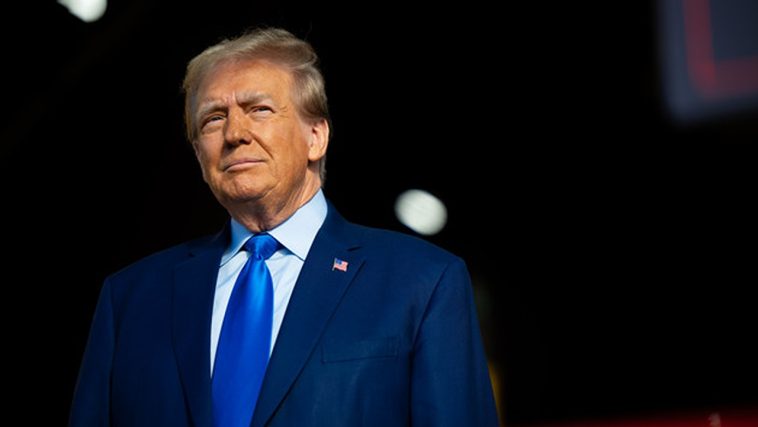LISTEN HERE:
Steven Sadow, legal counsel for former American President Donald Trump, stated on a recent Friday that any attempt to charge Trump with attempts to overturn the 2020 Georgia election results should be put on hold, especially if he is victorious in the upcoming election.
This discourse unfolded as the presiding judge in the case attempted to carve out a date for the trial amidst Trump’s existing legal issues and the fast-approaching political race. Trump, presently leading the pack for the Republican nomination for the 2024 Presidential race, is geared up to rival current Democratic President, Joe Biden.
Arguing for his client’s interests, Sadow contends that should Trump win in the next elections, calls for the postponement of his trial until his term concludes would be made, maintaining that an ongoing trial would disrupt his presidential duties.
Despite facing an array of state and federal prosecutions, Trump has shown an inclination towards delaying the cases until after the November 5, 2024 election. These observations reinforce the possibility that Trump could make use of his campaign, and a potential second term in the Presidency, as buffers to impede these trials.
This is even the case in state courts wherein Trump stands without the ability to grant himself pardons or directly influence the prosecutorial processes.
Anticipating these scenarios, Fani Willis, the Fulton County District Attorney, expressed her desire last week to commence the Georgia trial in August 2024. This proposed timeline would probably project the legal proceedings through the electoral season and spill over into the early part of 2025.
This proposal, however, raised questions of potential interference with the election process. Judge Scott McAfee posed a direct question to the prosecutors about the state’s stance on the possible crossing of paths between elections and the court trial.
Prosecutor Nathan Wade, speaking during the hearing, clarified that the district attorney’s decision of moving the case forward had nothing to do with marring the presidential elections.
‘The aim is solely to progress with this case, with no intentions of crossing paths with this presidential election,’ stated Wade. However, Trump and his team do not see eye to eye with the concept of an August trial. Sadow, voicing his concerns out loud during the session, wondered at the probability of the Republican Presidential nominee encumbered with legal defenses in court at the same time he is supposed to be on the election campaign trail.
Sadow raised the question, ‘Would it be conceivable to have the nominee of the Republican party for president unable to campaign due to their ongoing defense in court?’ The case, which involves Trump and 14 other co-defendants, all of whom plead not guilty, revolves around a believed coordinated undertaking to overturn Trump’s slight loss in Georgia after the 2020 elections.
Prosecutors argue they were part of a complex scheme, with charges spanning racketeering and other unlawful activities. Four out of the 19 original defendants have already pleaded guilty to lesser charges, agreeing to aid the prosecution as part of their plea deal. Meanwhile, Judge McAfee remains unconvinced that the 15 remaining defendants can be tried simultaneously.
In the Friday session, no specific date was fixed for the trial, but McAfee expressed doubt about the feasibility of a unified trial for all remaining defendants. As we continue to follow this story, it’s indeed a delicate path that walks together with politics, law, and order. Both the stakes of the election and the weight of the charges are indeed elements that demand intense attention.
Numerous legal commentators closely tracking the developments have scored points on both sides of the debate. The courts aim to maintain the steady progression of justice, irrespective of politics, while the political camps seek a clear path towards their campaigns that doesn’t overlap with complicated legal proceedings.
There are explicit lines drawn between the transitional motions of political interests and the enforcement of justice, and these complex interplays will continue to generate interesting unfoldments. While authorities proceed with caution, mindful of the potential for their actions to impact the election cycle and the rhythm of justice, the American public watches with bated breath.
The tug of war between presidential duties and legal responsibilities isn’t a new spectacle, but the potential impact on an election adds another level of complexity. The debate is being closely followed on numerous platforms, with legal professionals, political commentators, and the general public highly interested in the unfolding of these unique circumstances.
The discourse surrounding Trump’s potential second-term and his legal battles exemplifies how the American political system scrutinizes its leaders, while also demonstrating the system’s ability to keep equilibrium between justice and the exercise of democratic rights. Regardless of the outcome of these trials, they are indicative of a commencement: starting a dialogue about a political leaders’ responsibilities and the intersection between politics and the law.
The weeks and months ahead will undoubtedly reveal how these court and political struggles play out. As we find our way through these unfolding developments, we stand witness to a significant chapter in American politics. The ultimate expression of democracy, both in the law courts and at the polls, will be tested as America gears up for another presidential race.



